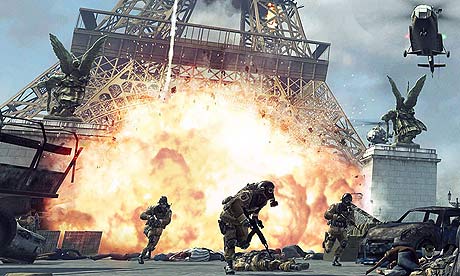
Video game publisher Activision Blizzard has announced a deal to buy itself back from French media giant Vivendi. The company, responsible for hits such as Call of Duty and World of Warcraft, will purchase 429 million shares for $5.83bn.
Concurrently, Activision Blizzard CEO Bobby Kotick and co-chairman Brian Kelly have formed ASAC II LP, an investment vehicle through which they will purchase 172 million company shares for approximately $2.34bn in cash, or $13.60 per share. This will make it the largest Activision shareholder, and the arrangement includes $100m personally invested by Kotick and Kelly.
Included in the same investor group is Tencent, the powerful Chinese investment company that runs social networks, internet service providers and online gaming portals in China.
"Tencent's investment as part of a group which now holds around 25 per cent of the company is an interesting development," said Piers Harding-Rolls, head of games at IHS Electronics and Media. "Activision Blizzard and Tencent are already business partners for the Chinese market, so the evolution of this relationship can only strengthen AB's potential IP reach into what is a massive market in its own right. IHS data shows the PC Online market in China reached $8.9bn in 2012, of which Tencent held 43 per cent. Our research also shows Tencent's dominance of the Chinese market is strengthening in 2013."
Vivendi will retain a 12% stake in the company, though according to Wall Street Journal sources, Vivendi's representatives on the Activision board – including current chairman Philippe Capron – are expected to step down.
"These transactions together represent a tremendous opportunity for Activision Blizzard and all its shareholders, including Vivendi," said Kotick in a statement released on Thursday. "We should emerge even stronger – an independent company with a best-in-class franchise portfolio and the focus and flexibility to drive long-term shareholder value and expand our leadership position as one of the world's most important entertainment companies. The transactions announced today will allow us to take advantage of attractive financing markets while still retaining more than $3bn cash on hand to preserve financial stability."
The merger of Activision with Vivendi's own games division, which included World of Warcraft creator Blizzard Entertainment, was announced in December 2007. The deal, worth $18.9bn, saw the creation of Activision Blizzard, now the largest third-party video game publisher in the world. Last year, the company announced record revenues of $4.86bn, and first-quarter figures for 2013 showed net revenues of £1.32bn.
Recently, however, Vivendi has been struggling to reduce its debt, reported to be in the region of $17bn. The conglomerate is also in talks to sell off its shares in African phone operator Maroc Telecom to Etisalat for $5.5bn.
Activision has now released itself from Vivendi's problems, but this could well bring new financial challenges.
"It is a substantial and gutsy move by Activision but also an eminently sensible one given the alternatives Activision faced," said Nick Gibson, an analyst with Games Investor Consulting. "Vivendi's majority stake combined with its own balance sheet difficulties could have resulted in raids on Activision's cash reserves – by forcing Activision to pay out large-scale special dividends – or other actions that might have jeopardised Activision's ability to operate.
"This move frees Activision from such threats but in doing so also radically weakens its balance sheet as the company goes from being largely debt free and hugely cash rich to having net debt of $1.4bn thanks to the use of $4.6bn in debt financing for the transaction. Needless to say, this presents its own set of problems although the Activision management clearly feel this is the more manageable and acceptable problem to have."
The Activision Blizzard buyout comes at a crucial time for the video game industry. Sony and Microsoft are about to launch a new console generation with the arrival of the PlayStation 4 and Xbox One this winter. Activision's Call of Duty Ghosts title is likely to be a key seller on the machines, as is next year's sci-fi adventure Destiny, a hugely ambitious new title from the studio behind the blockbusting Halo series.

